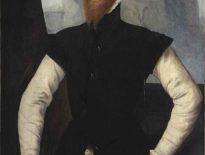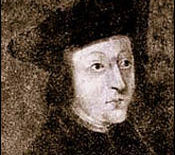The grandfather of Henry VII, Owen Tudor, or Owain ap Maredudd ap Tudur, was born in 1400. He was the son of Maredudd ap Tudur ap Goronwy and Margaret, daughter of Dafydd Fychan. He is believed to be descended from a prominent Welsh family, and it is thought that Owen’s family took part in the Glyndwr Rising, one of the last major attempts for Welsh independence. Little is known about the early life of Owen Tudor, and, in fact, a large proportion of his life is highly mythologised.
There are theories that Owen fought at Agincourt and became an esquire of King Henry V. In 16th century France, it was said that he was the illegitimate son of an alehouse keeper, and in 18th century Wales, it was purported that his father was a fugitive murderer. These rumours are largely unfounded and show just how much speculation there is regarding the early life of Owen Tudor. We know that in May 1421, an ‘Owen Meredith’ joined the service of Sir Walter Hungerford, who was the steward of the king’s household where he served in France. Following this appointment, his life once again becomes shrouded in mystery. It is within these years, however, that we know Owen Tudor met Queen Catherine, and this meeting has inspired romantics and writers of historical fiction and poetry for years. It is rumoured that the relationship between Owen Tudor and Catherine began when Owen met Catherine by falling into her lap while dancing, while another story claims that Owen Tudor caught Catherine’s eye while he was swimming! Regardless of how they met, however, their subsequent relationship would change the English monarchy, removing the Plantagenet dynasty and replacing it with their very own Tudor one.
Catherine was widowed in 1422, when Henry V. She initially lived with her son, King Henry VI, who was still an infant at this time, before moving to Wallingford Castle. It is rumoured that she had an affair with Edmund Beaufort, 2nd Duke of Somerset, however, although it was unfounded, shortly after these rumours, in 1427, a parliamentary statue was drawn up which regulated the remarriage of dowager queens. Despite this statue, Owen Tudor and Queen Catherine were married in secret. Owen and Catherine had three sons together, Edmund Tudor, Jasper Tudor, and Owen Tudor, and it is believed that they had a daughter who became a nun and sadly died while young.
Following the death of Catherine in 1437, Owen Tudor lost the protection of her status, and he was imprisoned in Newgate Prison. He escaped in 1438, but was recaptured and held in Windsor Castle. Perhaps due to position as the king’s stepfather, Henry VI granted Owen a pardon in 1439 and restored his previously confiscated goods and lands. Further to this, the king showed him increased goodwill by granting him an annual pension of £40 per year, a position at court, and by appointing him Keeper of the King’s Parks in Denbigh. His sons were welcomed at court in 1442, and Henry bestowed on them the titles of Earl of Richmond and Pembroke, and he publicly acknowledged them as his half-brothers. Owen Tudor gained from his sons’ positions, his pension being increased to £100 per year in 1459. Later in the year, Owen was commissioned to arrest a servant of John of Kidwelly, a known Yorkist in the beginnings of the War of the Roses. In 1460, Owen and his son Jasper were granted the offices in the Duke of York’s lordship of Denbigh.
In the next few years, Owen Tudor became embroiled in the War of the Roses, the fight for power between the House of Lancaster and the House of York. Owen sided with his son, Jasper, in Wales in 1461, and his army was defeated at the Battle of Mortimer’s Cross by Edward of York. Owen was captured and beheaded in Hereford, and his head was placed on the market cross there. It is said that moments before his execution Owen said “that hede shalle ly on the stocke that was wonte to ly on Quene Katheryns lappe.” He is buried in Greyfriars Chapel in Hereford.
by Georgia Whitehead
Georgia has just finished her masters in Classics at the University of Edinburgh. Academically, Georgia is interested in early Christianity, with her master's thesis focusing on "The Male Gaze and Self-Representation in Female Christian Narratives". In addition to her interest in ancient history, she has always been an avid lover of the Tudor era, drawn to the magnificence of the Tudor courts and the larger than life characters. She is particularly interested in The Reformation, Christianity and the shifting sands of ecclesiastical politics in this period and also has a keen interest in the lives of Tudor women. It is Georgia's ambition to become a writer, perhaps publishing her own Tudor novel one day.
Georgia also runs a history blog and instagram page called Historia Mundis.
Bibliography
- Gardiner J (1876). ‘The Historical Collections of a Citizen of London in the Fifteenth Century.’ Camden Society.
- Griffiths R.A, (1977) ‘Queen Katherine of Valois and a missing statute of the realm’, Law Quarterly Review, 93. 248–58.
- Sayles G.O, (1978) ‘The Royal Marriages Act, 1428’, Law Quarterly Review, 94. 188–92.




If Owen Tudor wasn’t the father of Edmund Tudor, that would have meant that Margaret Beaufort was related to her husband a bit too closely for comfort. Of course we don’t know if the rumours are unfounded, just that they haven’t been proven. There wasn’t any proof of a sexual relationship with Edmund Beaufort but he did come courting. This most probably was the truth that Owen was the father of all of his presumed children and he and Katherine had some happiness. They produced several children and Owen was said to have recalled his head being on the lap of the woman he loved when he was executed after Mortimer Cross. A marker still marks the potential execution place in the Market Square in Hereford.
Just brilliant. I love this particular era of history and up till now have been frustrated by a total lack of detail on this very important person who founded the Tudor dynasty.
Thanks! Very informative. Michelle t
Fascinating and enlightening! Many thanks!
(Recommend a spelling correction twice in one paragraph: “statute” instead of “statue.”)